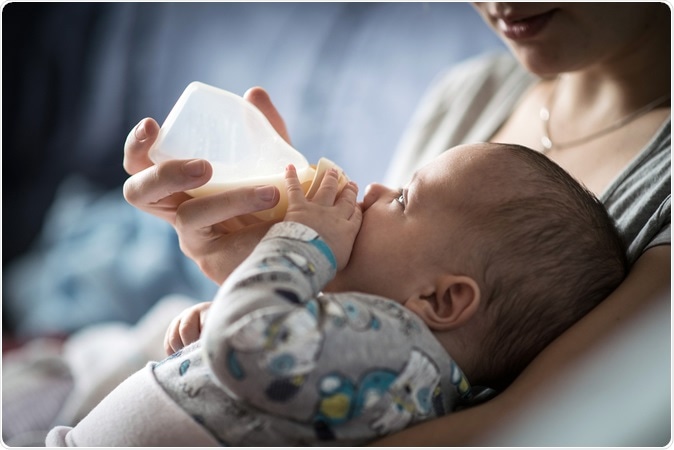
Infant milk allergy is being overdiagnosed say experts
There are a large number of babies who are diagnosed with milk allergy and are being supplemented with lactose free infant milk formula. Experts have claimed that this over diagnosis could be due to the influences of the formula industry. The results of the investigation titled, “Over diagnosis and industry influence: how cow’s milk protein allergy is extending the reach of infant formula manufacturers,” was published in the latest issue of the British Medical Journal.

Image Credit: Patrik Jech / Shutterstock
The researchers write that there has been a six fold rise in diagnoses of infant formula allergies over the past one decade. They have warned that it is not possible that so many more babies are developing “cow’s milk allergies” over this short period of time. The team explains that the guidelines that dictate the ways how milk allergy is diagnosed among babies is also influences by the manufacturers of formula feed for babies. There are industry-funded bodies that run the allergy training sessions and CMEs for doctors as well as health care professionals. This is leading to irrational and unnecessary proscription of the these non-allergenic formula.
One of the major problems with this is the mistaken belief that breast milk could be allergenic to the baby and this may discourage breastfeeding. Dr Fiona Godlee, editor-in-chief of the BMJ, said, “The growth in prevalence of cows' milk protein allergy [CMPA] has all the hallmarks of over diagnosis fuelled by commercial interests. We need tighter diagnostic criteria and guidelines drawn up by experts who are free from financial conflicts of interest.” The report shows that between 2000 and 2016 there has been a rise from 105,000 to more than 600,000 annually in prescriptions for specialist formula milks prescribed to those who are allergic to regular milk. The report adds that the NHS was spending £8.1million on these specialist formula and is now spending to more than £60 million annually on these preparations.
Nigel Rollins, of the World Health Organisations' department of maternal, newborn, child, and adolescent health in a statement said, “It's reasonable to question whether these increases reflect a true increase in prevalence.” Dr Chris van Tulleken, lead author of this study and honorary senior lecturer, University College London Hospital said, “The extensive links between the formula industry and the research, guidelines, medical education, and public awareness efforts around CMPA have raised the question of industry-driven over diagnosis.” He pointed out that in the board of NICE (NHS body for guidelines development) that drew up the allergy guidelines, 5 of the 11 had declared their associations with the infant formula industry. Further the international guidelines released in 2007 and 2010 were sponsored by formula manufacturers. The five authors of the 2013 Milk Allergy in Primary Care guidance had conflicts of interest. This is unacceptable, he said.
Dr van Tulleken wrote in the article, “The Allergy Academy, which is sponsored by three infant formula manufacturers, delivers courses on Guy's and St Thomas' premises [in London]. These are described by the trust as private 'evidence-based training days for healthcare professionals.” He referred to these specialists formulas as “Trojan horses” saying that companies use these to market their other baby formulas via doctors which are normally banned from marketing. He wrote, “The belief that specialist formulas are exempt from the code may be enabling manufacturers to justify this network of links with clinicians and institutions to pursue a wider agenda.”
The World Health Organisation (WHO) also believes that this trend could have an adverse effect on breastfeeding. Larry Grummer Strawn, a technical officer at WHO, in a statement said, “The influence that the formula industry has on young health professionals is likely an important reason for the lukewarm support for breastfeeding that we often encounter.”
Declan O'Brien, director general of the British Specialist Nutrition Association, whose members include Danone Nutricia, Mead Johnson and Nestlé in a statement defending the charges said, “We recognise the need to put in place policies to ensure that potential conflicts of interest can be managed and avoided. The measures in the Infant Formula Industry Code are in line with the WHO Code, UK regulations, the Association of the British Pharmaceutical Industry code and General Medical Council guidance.”



































No hay comentarios:
Publicar un comentario